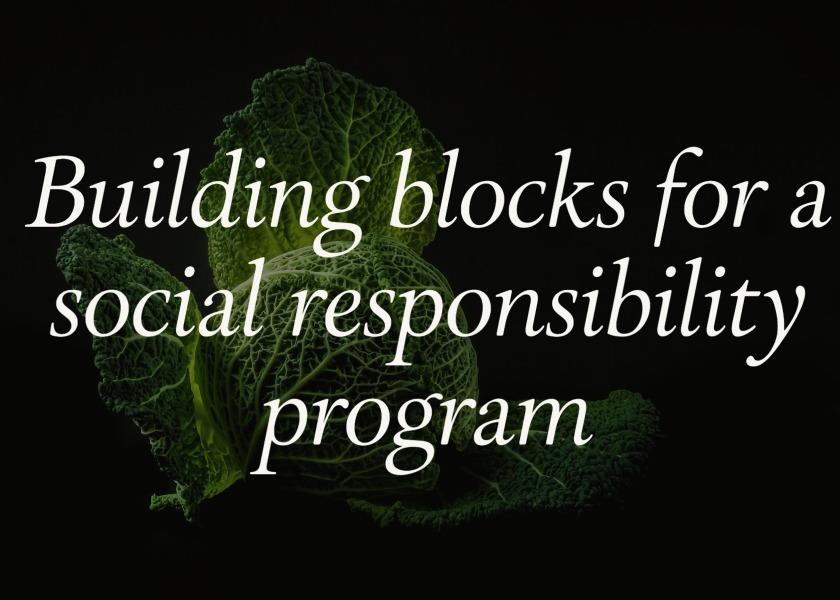Building blocks for a social responsibility program

If a produce company was to build a social responsibility program, what should it consist of?
The Packer asked 41 produce industry leaders this question in a recent survey: “What are the essential elements of a responsible social responsibility program?”
The responses often pointed to a wide-ranging approach that aim to meet the needs of people in their organization, with specific goals identified and tools in place to measure progress.
Social responsibility programs need to give workers basic access to information, fair working conditions, opportunity for dialogue and a commitment to non-discrimination, said Kieran Ficken, sustainability program manager for Measure to Improve, LLC. “Workers should not be placed in environments that are unsafe, or obligated to do work under unreasonable conditions or for unreasonable hours,” Ficken said. “At its most basic level, this means workers are truly working of their own volition and are not victims of human trafficking. It is unfortunate, but still a problem in parts of this industry.”
Related: Integrating worker voice in ag operations key to success, panelists
Ficken also said that giving workers a voice is essential.
“Workers need to know that they can bring forward concerns about their working environment, including safety and harassment, without fear that they will be punished or retaliated against for doing so.“
A code of conduct should be part of a social responsibility program, with expectations for your own company, suppliers and vendors, said Oren Jaffe, sustainability manager for SCS Global Services.
That, Jaffe said, should be combined with a public commitment to social responsibility and ethical business practices, risk mitigation programs, third party social audits and ongoing training and certifications.
Third party verification/certification and employee empowerment to embrace the concept of continual improvement are helpful to social responsibility programs, said David Bell, CMO, Houweling’s Group.
There is no need to reinvent the wheel, said Jennie Coleman, president of Equifruit, Inc. She said Equifruit relies on the transparent standards enforced through Fairtrade International certification, both for growers and traders. The standards cover the three pillars of sustainability: economic, social and environmental.
A social responsibility program should include a set of basic values to guide operations, and meaningful ways and systems to support those values, said Susan Futrell, marketing director of Red Tomato. After that, a set of measurements and evaluation tools are needed to track progress, she said.
Related: Communications toolkit provides messaging for #AlwaysEssential Workers
Focusing on specific goals and engaging stakeholders and partners across the supply chain are essential elements of social responsibility programs, said Steve Roosdahl, vice president of operations for The Oppenheimer Group.
“Measurability is another element that is important to sustainability programs as a whole and social responsibility initiatives in particular, as are transparency and complementary communication programs,” Roosdahl said.
Getting a company’s culture “right” with regard to treatment of people is a first step, said Michael Agostini, owner of Miago Produce Services Consulting. That, Agostini said, is followed up with having an effective way to monitor efforts and the outcomes created.
Management must have little tolerance for missing the mark on the desired plan, he said.
Another essential is having an open communications programs that employees can use, easily and discretely, to let management know when they see things that are not right.
Finally, Agostini said, a company must have the resolve to deal with those who try to abuse the system.
The bigger picture
“(Social responsibility programs) should provide a safe and sustainable workplace - emotionally, physically, spiritually, financially. It’s a holistic approach that includes the people, the earth and the overall sustainability of the operation - it’s not just one thing,” Cherie France, marketing manager for Homegrown Organic Farms.
Social responsibility programs should start with a purpose and how that ties to a company’s overall mission and goals, said Brianna Shales, marketing director for Stemilt Growers. “The program needs measurable goals to help it succeed. It has to have a cross-functional team on board, as covering all areas of social responsibility cannot live in one department alone,” she said.
Walt Dasher, vice president of G&R Farms, said the company’s social responsibility program includes sustainability elements that speak to protecting the environment, minimizing the impact from packaging and improving the lives of the company’s farmworkers by ensuring fair wages, good working and living conditions and by protecting their health and safety. Beyond that, charitable giving is important to the company.
“We implement two annual campaigns to raise funds for the non-profit organizations in the communities we serve and this includes our Seasons of Giving and Growing America’s Farmers promotions,” Dasher said.
Related: Long-term strategies for social responsibility — Podcast
In general, respondents said social responsibility is part of a bigger picture.
A meaningful social responsibility program needs to be part of a strategic sustainability Agenda and should address some of the most pressing issues of our time,” said Andrew Southwood, director and owner of freshXpressions. “These would include the climate and water crisis, food security , regenerative agriculture practices and social equality in the workplace and communities workers come from.”
Social responsibility should be part of a bigger sustainability initiative, said Mark Gale, chief growth officer at C.O.nxt. “Social justice is tied to the overall supply chain just as elements of environment, community, worker issues and even ability of a company to make a profit to remain viable,” he said.







